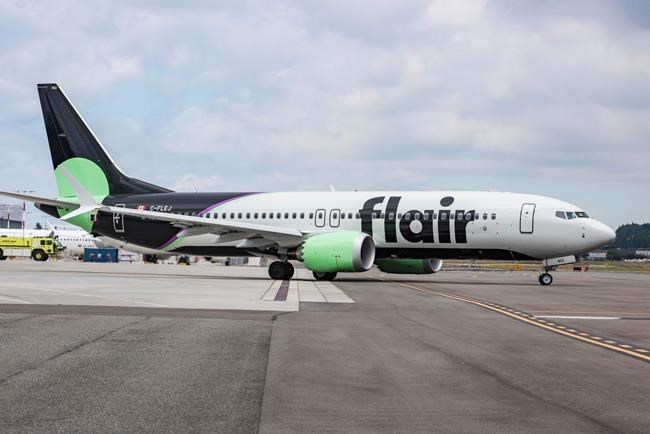
Passengers travelling with Flair Airlines were «impacted» on Saturday after four of its leased aircraft were seized in Toronto, Edmonton and Waterloo, Ont., in what the company described as a «commercial dispute.»
A statement from the air carrier called the move by «a New York-based hedge fund» to take the aircraft «extreme and unusual.»
It said Flair would use «additional fleet capacity» to lessen the affects on passengers, adding it did not foresee any major disruptions to its route map.
Company spokesman Mike Arnot said a number of Flair flights were cancelled Saturday morning, but the company had three spare aircraft to backfill those flights.
Arnot says passengers travelling in the next 72 hours will either be accommodated on Flair flights or another airline at Flair’s expense if a Flair flight isn’t available.
An update from the company later Saturday added that customers can also rebook their own travel and receive a reimbursement within seven days.
A person familiar with the matter but who was not authorized to speak publicly about it said the payments for the affected planes were only a few days behind and the amount owed was small relative to Flair’s overall revenue.
«We are truly very sorry passengers were impacted today, and are taking steps to get them on their way with minimal disruption. This includes repositioning our spare aircraft to support operations,» the company’s statement said.
The leasing company, which Arnot confirmed was Airborne Capital, did not immediately respond to an email seeking comment.
Flair’s statement said the airline has been involved in «ongoing communications» with the leasing company and «payment has been initiated.»
«Flair Airlines will continue to engage in a consensual mediation with the lessor to remedy the situation,» the statement said.
The disruption occurred as airports and airlines prepared for a surge in passengers during spring break, which kicks off in Ontario this weekend.
Flair Airlines launched in 2004 as a charter airline and began offering regularly scheduled service in 2018.
The low-cost, Edmonton-based airline announced in September it planned to become Canada’s third-largest domestic airline by this summer and expand its fleet to 30 aircraft by the end of 2023, serving 70 routes.
It has faced obstacles, including a months-long battle last year over whether its relationship with a Miami-based investor violated rules restricting foreign entities to no more than 49 per cent ownership of a Canadian airline.
The dispute ended when the Canadian Transportation Agency ruled the airline was Canadian and could keep its licence, following Flair’s moves to rejig the composition of its board to ensure at least half the directors are Canadian and to end any unique shareholder rights by the investor.